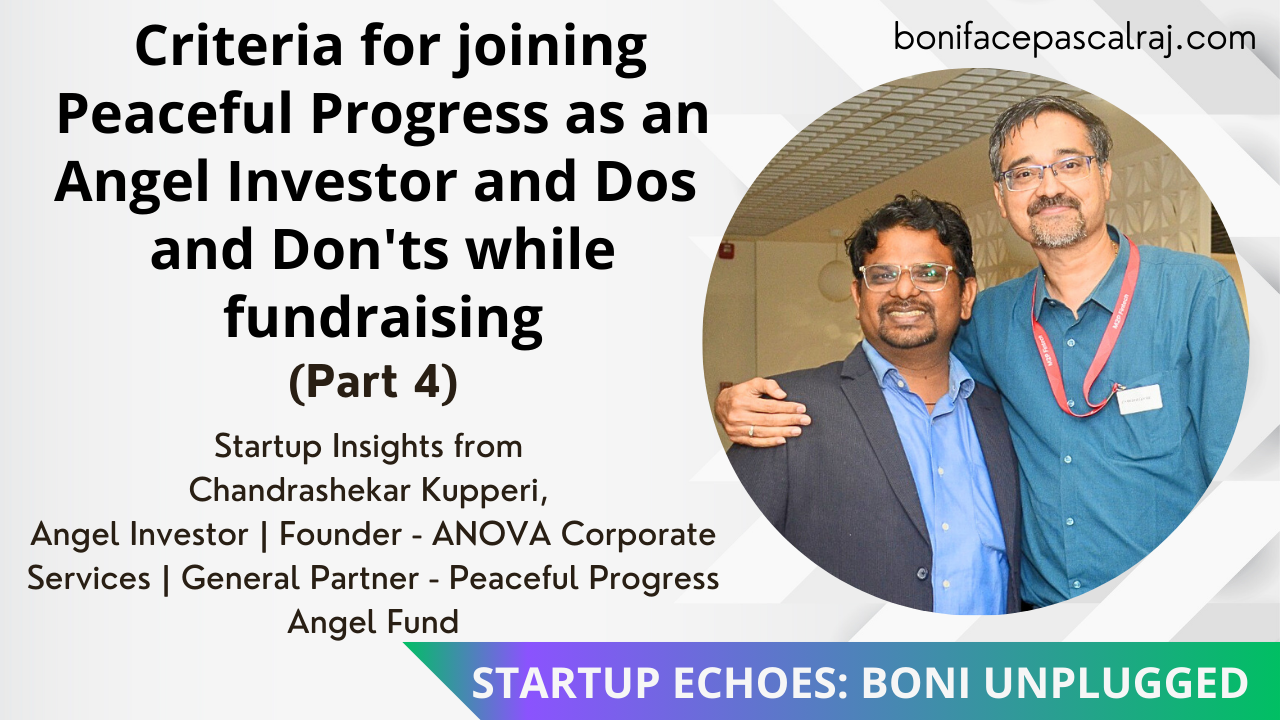In the labyrinth of startups and investments, Shekar Kupperi, the driving force behind Peaceful Progress, shares invaluable insights garnered from years of experience. From the intricate details of cap tables to guiding aspiring angel investors and founders, Shekar’s journey unfolds as a masterclass in the world of entrepreneurship.
Democratizing Angel Investments with Peaceful Progress
A crucial aspect often shrouded in mystery is how investments through Peaceful Progress reflect in a startup’s cap table. Shekar clarifies that only one name, Peaceful Progress, will be present, elucidating the venture’s commitment to democratizing angel investments. As a Category 1 venture capital fund registered with SEBI, Peaceful Progress adheres to a rigorous process involving monthly and quarterly reporting, trusteeship, and extensive documentation. The single-name presence in the cap table emerges as a compelling reason for startups to engage with Peaceful Progress.
The Art and Science of Angel Investing
Shekar’s advice for budding angel investors transcends the conventional. Angel investing, he asserts, is both an art and a science. Drawing from his personal experience of investing in 50 startups, Shekar emphasizes the addictive and risky nature of angel investing. The essence lies in understanding the process, learning from seasoned investors, and mitigating risks. Angel investing demands courage, a carefully crafted mental map, and a foundation of trust. Shekar advocates starting slow, starting small, and building gradually and smartly in areas where one feels comfortable.
Criteria for Joining Peaceful Progress as an Angel Investor
For those eyeing entry into Peaceful Progress as angel investors, Shekar outlines the SEBI-guided criteria. An individual needs a net worth of at least two crore, aligning with SEBI’s definition of accredited investors. Corporate entities must meet a net worth of Rs. 10 crores. Shekar emphasizes the simplicity of the self-declaration process, coupled with due diligence that includes a thorough examination of investors’ profiles, business affiliations, and employment history. The KYC process, overseen by a trustee, ensures regulatory compliance.
Operational Insights and Tech Savviness
Peaceful Progress navigates its operations through a bespoke ERP tool, a testament to its commitment to tech-savvy entrepreneurship. Shekar highlights the importance of being tech-savvy when investing in tech startups, a lesson learned through initial experiences with external software that fell short of their requirements. The emphasis on developing an in-house tool showcases the venture’s dedication to operational efficiency.
Advice for Founders Seeking Angel Investments
Shekar switches gears to offer invaluable advice to founders seeking angel investments. He begins with a list of “don’ts” that often lead to the loss of investor interest. From debunking the myth of the “first mover advantage” to emphasizing the significance of competition and managing investor expectations, Shekar provides a roadmap for founders. He underscores the importance of understanding the startup’s stage, honing sales skills, choosing the right monetization channel, and embracing metrics for effective management.
Don’ts:
Impress and Inspire, but Avoid These Pitfalls:
- Myth of the First Mover:
- Don’t overestimate your idea. The myth of the “first mover advantage” is dispelled by Shekar. While an earlier mover advantage can be acknowledged, banking solely on being the first is rare. Instead, focus on the substance and uniqueness of your offering.
- Perfectionism Pitfall:
- Don’t be a perfectionist. Shekar advises against prolonged development cycles. Move through stages—alpha version, beta version, MVP. If you’re not slightly embarrassed by your product at launch, you’ve launched too late. Embrace iteration and improvement.
- Acknowledge the Competition:
- Don’t forget that you are competing. Recognize that competition surrounds you. Your efforts should not only stand out but inspire angel investors to see the potential for differentiation and success.
- Realistic Expectations:
- Don’t expect immediate funds. It’s unrealistic to anticipate funding right after the first or second meeting. Evaluate investors as much as they evaluate you. Understand their fit, the due diligence they plan to conduct, and whether they align with your vision.
- Money Isn’t the Magic Solution:
- Don’t think money solves all problems. Funding isn’t a panacea. Clearly define how you’ll use the raised funds. Understanding and meeting investor expectations will fortify the founder-investor relationship, akin to a long-term partnership.
- Resilience in the Face of Rejection:
- Don’t be discouraged by a ‘No.’ Shekar echoes Dr. APJ Abdul Kalam’s wisdom: “NO means Next Opportunity.” Rejections are not the end but a stepping stone to the next chance.
Dos:
Crafting a Winning Strategy:
- Understand Your Stage:
- Understand the startup stage. Whether in the formation, validation, or growth stage, tailor your approach to match the current needs and challenges.
- Sales Acumen:
- Can you sell? Selling is a vital skill. A founder should either possess this skill or bring in a partner who excels in sales. Identify your channel partners to enhance your distribution strategy.
- Clarity in Monetization Channels:
- Define your channel to monetize. Clearly understand if your strategy is B2B, B2C, B2B2C, or D2C. This clarity is essential for attracting the right investors aligned with your business model.
- Metrics Matter:
- Metrics are crucial. If you cannot measure, you cannot manage. Metrics provide tangible insights into your business’s health and performance.
- Team Building Expertise:
- Build a strong team. The team is not just a collection of individuals but a storyline that defines the journey of your startup. Investors are keenly interested in the people driving the venture.
In Shekar’s blueprint for founders, the path to securing angel investments is not just about presenting a promising idea; it’s about understanding the nuances, avoiding common pitfalls, and strategically navigating the entrepreneurial journey.
Work-Life Balance and Family Acceptance
In the challenging entrepreneurial journey, Shekar delves into the critical aspect of work-life balance. Drawing from personal experiences, he emphasizes the need to be fully present in each moment, whether personal or professional. Open communication with family and friends becomes paramount in establishing this balance.
Shekar concludes with a poignant reflection on failure, resilience, and the significance of family acceptance. His journey, from stability to building stability, reflects the essence of entrepreneurship—embracing life’s teachings, enjoying the journey, and, above all, seizing success despite setbacks.
In Shekar’s narrative, the angel investment frontier transforms from a complex landscape into a navigable path for aspiring investors and founders alike.
Dive into the complete discussion with Shekar by viewing the in-depth video on my YouTube channel.



